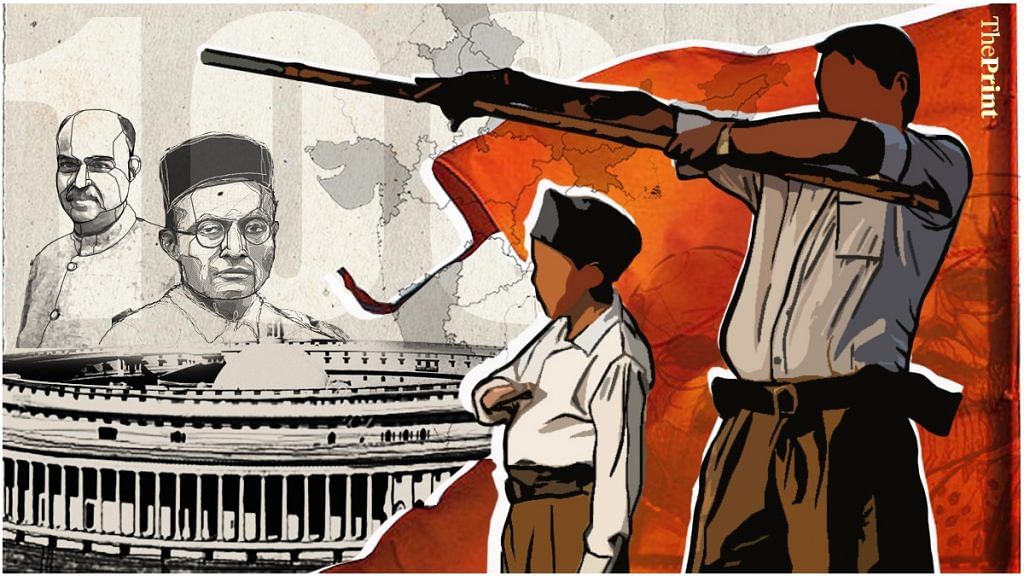All conversations and political commentary these days are focused on the 2024 national elections, and what might happen after. The chatter is about Narendra Modi, Yogi Adityanath, Prashant Kishor and Mamata Banerjee’s coalition calculators. But forget 2024, the real year to focus on is 2025. And nobody is talking about it. It is the year the Rashtriya Swayamsevak Sangh will hit a century. And the 2024 election will pale in comparison to the celebrations and events around 100 years of the RSS.
It is not unlike the grand 100 years commemoration of the Chinese Communist Party.
The reason we are not focusing on 2025 is because too much national attention is on the Bharatiya Janata Party, Modi and Amit Shah, and not enough on the RSS. But the RSS is to Modi, what CCP is to Xi Jinping. RSS’ foremost objective is to change desh ki soch. And electoral power is just a useful handyman toward that goal.
Also Read: RSS roadmap before it turns 100: New debate on freedom struggle & radical Islam, expansion
Vision board for a 100-year-old RSS
What RSS does in the run-up to 2025 and between Vijaya Dashami of 2025 and 2026 can potentially change the way the next two generations of Indians think, and how the ‘Hindu Rashtra’ organisation is perceived among the young.
Discussions about 2025 have begun, though it is still baby steps. The pandemic delayed much of this.
There is now an effort to begin collecting the institutional histories of all the Sangh groups — around 90 by some estimates including religious, educational, national security and tribal organisations — and achievements, goals and personalities associated with each of them.
Over the next five months, different Sangh organisations will conduct a series of meetings all over India, both at the level of geographical units and the institutions, to deliberate on the question of how best to observe and celebrate RSS 2025. By October 2022, all these inputs will be taken up by national units. Each organisation will also set a growth target for 2025. For example, the RSS right now conducts around 52,000 shakhas today. They would probably aim to double that by 2025.
Also Read: RSS’ new team has a message for the BJP
Numbers se narrative tak
How is the RSS going about creating this new desh ki soch ahead of 2025?
The thinking in the RSS for some time is that even though they have the bahumat numbers, they still don’t have the grip on the narrative. That the opinion makers are dominated by liberal or progressive thinking, and are easily able to set an international narrative against Citizenship (Amendment) Act, abrogation of Article 370, farmers’ agitation, Hathras, etc. That, despite ruling from Delhi since 2014, Hindutva groups haven’t percolated these opinion-creating ‘spaces’.
So the run-up to 2025 will be a journey of ‘numbers se narrative tak’. And that is a deeper, longer-term ideological project.
Toward this goal, there is a move to consolidate content creation through books, school curriculum, films, exhibitions, documentaries and forging an ecosystem of ‘independent’ intellectuals. Mohan Bhagwat’s comments on the OTT universe and Adityanath government’s invitation to the movie industry to come to Uttar Pradesh are all an acknowledgement of the power of capturing cultural content.
A number of these projects, overseen by committees consisting of RSS sympathisers, will bear fruit next year when India celebrates its 75 years of Independence. Two museums are planned near the Red Fort area – one on Subhas Chandra Bose and the other on Kashmir. There is also a 75-episode TV series called Swaraj for Doordarshan. But it won’t just dish out the regular anti-colonial struggle seen through the roles of Gandhi, Jawaharlal Nehru and Bal Gangadhar Tilak, but also of civilisational greatness and uprisings. Proposed changes in history textbooks are another move.
Also, much was made of the meeting of media editors with Mohan Bhagwat recently, but not too many took note of his meeting with around a dozen book publishers a couple of months ago. The goal is to publish more books on Indian history, unveil stifled histories and historical personalities.
One ongoing effort is to create around 1,000 educated ‘organic’ Dalit influencers (not social media) and work with them in a way that Hathras-like anti-BJP narrative doesn’t gain ground in the future.
Also Read: RSS doesn’t run BJP by remote, it isn’t a school principal regulating BJP leaders as students
Evolution from Emergency to 2025
The RSS has gone through several phases in its 100-year history. From the Gandhi assassination fallout and the ban to the setting up of Bharatiya Jana Sangh in 1951 to Emergency. The period between 1975 and 1995 was one of rapid growth; then in 1998, when Atal Bihari Vajpayee became the first pracharak prime minister; then post-2014.
“Gandhi murder threw us 20 years behind, Emergency pushed us forward by 20 years,” former sarsanghchalak Balasaeb Deoras used to say.
In fact, RSS leaders like to say that their philosophy can no longer be dismissed as the fringe or alternative intellectual discourse of India. The Overton window is already shifting the intellectual axis. Much like the ‘Congress system’, the RSS now must also create its own. Cultural and intellectual ground must now align itself with political power.
Politics is as much about capturing intellectual spaces and vimarsh as winning elections. But much of Indian political commentary is compulsively and chronically stuck in party politics, intrigue and election analysis. While we look away and scatter our energy, the RSS is quietly going about its ‘Changing-India’ project.
Of course, the cumulative benefit of all this narrative-setting will also go to BJP. Although the RSS likes to call itself a ‘socio-cultural organisation’, its fallout on the political structure of the country is certain.
Rama Lakshmi is the Opinion and Features Editor at ThePrint. She tweets @RamaNewDelhi. Views are personal.
(Edited by Srinjoy Dey)
